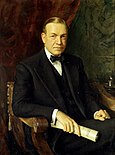Portal:Oregon/Selected biography/18
Charles McNary (1874–1944) was a Republican politician, best known for serving as Oregon's U.S. Senator from 1917–1944, and as Senate Minority Leader from 1933–1944. Before serving in the Senate, he served on the Oregon Supreme Court from 1913 to 1915 and was dean of Willamette University College of Law from 1908 to 1913 in his hometown of Salem, Oregon. In 1917, he was briefly appointed to the U.S. Senate to fill a vacancy, but lost the subsequent election to Frederick W. Mulkey, who took office on November 6, 1918. Mulkey resigned after taking office, and McNary was re-appointed to the Senate on December 12, 1918. He was re-elected in '24, '30, '36, and '42. McNary served in Washington, D.C. until his death in 1944. In 1933, he introduced legislation that led to the building of Bonneville Dam on the Columbia River. In 1940, he was the Republican vice presidential nominee, as a western conservative to balance the eastern liberalism of presidential nominee Wendell Willkie. The Willkie-McNary ticket lost the Electoral College to incumbent Democrat Roosevelt, 449 to 82.

